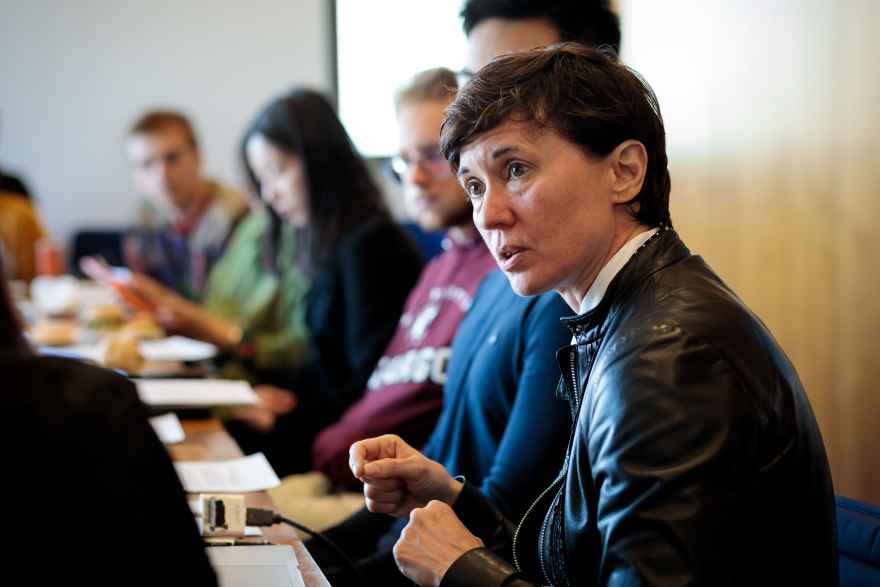Kimberly Peirce Reflects on How UChicago Shaped Her Filmmaking Career

The following was published in UChicago News on November 19, 2019.
By Jack Wang
When Kimberly Peirce made Boys Don’t Cry two decades ago, she created the movie as a labor of love. The University of Chicago alum wanted to tell the story of Brandon Teena, to honor the courage and imagination of a trans person who lost his life in pursuit of his true self.
But the small, independent film became a surprise hit and cultural touchstone, one that established Peirce as a director and helped shape a national conversation about gender and sexual identity.
None of that would have been possible without UChicago, Peirce insisted during a recent visit to campus. This is where she got lost in the study of Shakespeare and history and physics—and where she met a young professor whose honest advice transformed her career path.
“We really have to celebrate Lauren Berlant,” said Peirce, AB’90. “She took me under her wing. She gave me permission to dream, and to follow my great passion to tell stories.”
A renowned literary scholar and cultural theorist, Berlant had arrived at UChicago only a year before Peirce—and had done so with a willingness to expand the educational canon, highlighting writers such as Julia Kristeva and Monique Wittig in a class on lesbian feminist theory.
That class felt to Peirce like “a beacon,” calling her toward the value of voices that weren’t male, straight and white. When she returned to Hyde Park following a two-year hiatus in Asia, where she worked as a photographer to save money for her studies, Peirce told Berlant that she wanted to become an academic.
“She rightly told me, ‘I just don’t think you’re cut out for it,’” Peirce said to an audience waiting to watch a screening of Boys Don’t Cry. “So sometimes, teachers tell you what you’re not supposed to do.”
Sitting a few rows back at the Logan Center for the Arts, Berlant raised her hand: “I just want to say that there was another part of that sentence, which is, ‘You’re really great at reading film.’”
It was a talent that Peirce herself had not yet identified. Her conversation with Berlant prompted her to enroll at Columbia University, where she wrote a graduate thesis that became the script for Boys Don’t Cry. The feature film eventually won Hilary Swank an Oscar for her portrayal of Brandon Teena.
“To make a movie like Boys, I had to be classically trained in film, but I also had to be schooled in terms of gender and sexual identity,” said Peirce, who at the time was discovering her own queerness. “I had to access both the classical side and then the radical, personal side.”
When Brandon Teena’s 1993 death became a national headline, Peirce was captivated by “the power of this person’s imagination”—by his ability to follow his desires even without the language to navigate them. She soon traveled to the murder trial in Falls City, Nebraska, joining the activist group Transexual Menace, which included Riki Anne Wilchins and Kate Bornstein. Over the next five years, Peirce accumulated thousands of pages of research, including court transcripts, news clips and interviews she conducted with those who knew Brandon. While casting for the lead role, she recorded hundreds of auditions and rehearsals, including many with trans men, drag kings and other non-binary actors.
Peirce is gathering those materials to donate to the Academy of Motion Picture Arts and Sciences, which will preserve them at the Margaret Herrick Library in Beverly Hills, California. For Peirce, making the collection accessible illuminates the creative constraints of a two-hour film. It also marks a step toward the “necessary saving and archiving of queer history,” and invites the public to better understand a life that still captivates her.
Following the on-campus screening organized by UChicago’s Film Studies Center, Peirce sat with a faculty panel that featured Berlant, the George M. Pullman Distinguished Service Professor in English, as well as Prof. C. Riley Snorton and Asst. Prof. Kris Trujillo.
Peirce reflected on how public discussion of trans and queer issues has shifted since Boys Don’t Cry premiered in 1999, disseminating language and concepts that weren’t commonplace for an earlier generation. Berlant brought up the movie’s depiction of stalking, as well as the tenderness of its final romantic scene. Snorton, a black and trans scholar, pointed out the film’s themes of confinement and escape, and the moments of ritualized masculinity that made him feel “ill at ease.”
“People tell me that I’m rigorous,” Peirce said in an interview the next day. “I got that from here. Most film directors are not sitting on panels with academics talking to them about contemporary theory. I’m able to do that partly because I was trained here.”
She ended her visit by teaching a three-hour master class with Judy Hoffman, a documentarian and a professor of practice in UChicago’s Department of Cinema and Media Studies.
Before students practiced pitching their films, Peirce reminisced about her time in Hyde Park, and the mentors who helped her along the path to Hollywood. Berlant, for one, has been a lifelong friend, advising her on professional pursuits as well as personal challenges. They live nearly two thousand miles apart, but still talk at length several times a year.
“Throughout your life, amazing people will pop up,” Peirce told the students. “It’s your job to listen to them, and to be open.”